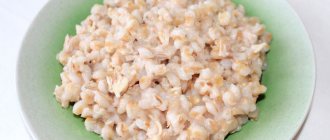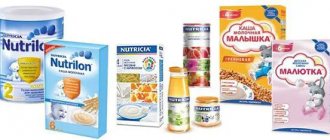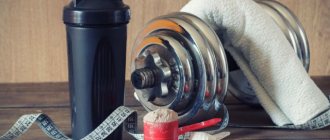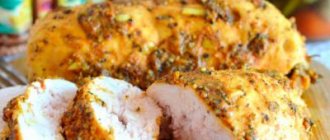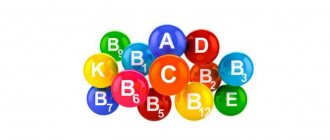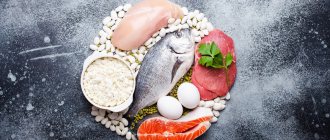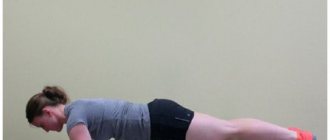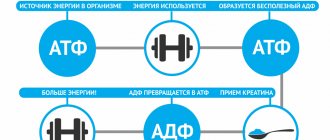A beautiful, athletic, pumped up body is not only a slim figure and the absence of problem areas, but also prominent muscles. To make their muscles more expressive, many people focus on strength training and go to the gym to lift weights almost every day.
However, sport is not the only component of success in achieving such a goal. It needs a building material with which it will work—a diet. What a person eats during the day, combined with physical activity, allows one to improve physical performance. Therefore, you need to know how to properly organize nutrition for gaining muscle mass, which contributes to effective body sculpting.
general characteristics
When creating a diet for gaining muscle mass, follow the recommendations of sports nutritionists and trainers. There are a number of principles on what nutrition should be like to build muscle.
Correct
Remember the iron rule: to gain muscle mass you need the right diet. If someone suggests going on a diet for this, immediately turn on the filter, as this is incorrect information. What will be needed is not restrictions, but rules:
- adherence to the regime (eating by the hour);
- variety of dishes;
- clear drinking regime;
- chewing thoroughly;
- a certain volume of portions;
- minimal amount of salt and sugar;
- absence of harmful products.
The most important condition is that the diet must be healthy, that is, useful and not disrupt the functioning of the body’s systems.
Balanced
To build muscle, your diet needs to be balanced. It must contain all the necessary nutrients:
- proteins - 40% of daily calories (60% - animal, 40% - plant);
- fats - 20% (60% - vegetable, 40% - easily digestible animal fats, found in fish and seafood);
- carbohydrates - 40% (85% - complex, 15% - simple).
Meals should also be balanced according to BJU:
- breakfast - 40% of daily calories (proteins, complex carbohydrates);
- two snacks - 5% each (proteins, simple and complex carbohydrates);
- lunch - 30% (proteins, fats, complex carbohydrates);
- dinner - 20% (easily digestible proteins, very few carbohydrates).
You should also keep in mind that to gain lean muscle mass, the diet should be predominantly protein, since it is necessary to start the fat burning process and remove excess water. Therefore, the amount of fat is sharply reduced to a minimum, and carbohydrates are consumed exclusively as sources of energy for physical activity.
Fractional
A three-meal regimen is not suitable for athletes who want to build muscle. They need regular replenishment: during training, there should be enough energy and nutrients to give 100% and start the necessary biochemical processes in the body. Main principles:
- eat often - at least 5-6 times a day;
- despite a sufficient amount of carbohydrates in the diet, do not overeat;
- eat strictly according to the clock;
- It is advisable to arrange snacks like this: carbohydrate snacks - an hour before training (to replenish the necessary energy), protein snacks - within half an hour after it (to launch recovery processes in muscle fibers).
Fractional nutrition allows an athlete to always be at the peak of activity and not experience energy deficiency, which is important for gaining muscle mass.
A few words about separation
There are bodybuilders who eat separate meals and do not experience problems gaining muscle mass. This is due to the fact that the main advantage of such a diet is improved digestion. At one meal, only foods that are combined with each other are consumed, which facilitates the process of their processing in the gastrointestinal tract. For those who have to eat mainly protein dishes, this is a valuable feature of a separate nutrition system.
Here you can choose either Sheldon’s concept (divides foods into protein, fatty, carbohydrate-containing, non-starchy, sour and semi-acidic) or Semyonova’s technique (proteins, carbohydrates, vegetable and animal fats).
However, separate meals require too detailed elaboration of the menu. It is extremely difficult to compose it yourself. You need to clearly know which foods can be combined in one meal, and which are strictly prohibited. And it’s still not aimed specifically at building muscle. Its initial task is to improve the health of the gastrointestinal tract.
So, when organizing your meals to gain muscle mass, make sure that, first of all, it is correct, balanced and fractional.
Why do you need sports nutrition? Large selection by category!
Great overview of sports nutrition categories! How this or that supplement can help you achieve your goals. For your convenience, the article has added links to categories and products, where you can learn more about specific additives and place an order. Ask us additional questions about the products you are interested in in the FAQ section.
Protein is a protein that is the basis of muscle tissue.
Why: to reduce body fat, to stimulate muscle growth, and also to maintain a healthy physical shape.
Types of protein:
Whey protein is a fast-digesting protein made from whey.
Why: to reduce body fat, to stimulate muscle growth, to restore muscles, and also to maintain a healthy physical shape.
Multicomponent protein is a mixture of proteins of different origins (egg, whey, soy, etc.) with varying degrees of digestibility.
Why: to reduce body fat, to stimulate muscle growth, to restore muscles, and also to maintain a healthy physical shape.
Casein is a long-lasting complex milk protein. Helps suppress appetite, as it is absorbed within 8 - 12 hours.
Why: to reduce body fat mass, to slow down catabolism during sleep.
Isolate is a highly purified whey protein that contains virtually no fat or carbohydrates. Why: to reduce body fat, to stimulate muscle growth, to restore muscles, and also to maintain a healthy physical shape.
Hydrolyzate is a highly purified whey protein that is split into individual fragments that penetrate the muscle very quickly. The hydrolyzate contains practically no fat and carbohydrates. Less allergenic than other forms. The most expensive type of protein. May have a bitter taste.
Why: to reduce body fat, to stimulate muscle growth, to restore muscles, and also to maintain a healthy physical shape.
Other categories:
Gainer is a protein-carbohydrate mixture that helps increase body weight and quickly replenish energy reserves.
Why: to stimulate muscle growth, to restore muscles.
BCAA is a complex of 3 essential amino acids: leucine, valine, isoleucine. This is the main material for building new muscles, but these amino acids are not produced by the human body, so they must come from food.
Why: protecting muscles from destruction, increasing lean muscle mass.
Fatty acids are essential fats of animal and plant origin that are not reproduced in the body and therefore must be supplied with food.
Why: to improve metabolism, accelerate the growth of lean muscle mass and reduce body fat, restore heart vessels, improve the condition of hair, nails and skin.
Amino acids are nutrients that make up all the proteins in the body. The body uses them for its own growth, repair, strengthening and production of various hormones, antibodies and enzymes.
Why: increase in muscle strength and mass, restoration of physical and mental tone after training, catabolism, lipolysis of subcutaneous fat.
Joints and ligaments are drugs that strengthen ligaments, accelerate the restoration of cartilage, relieve inflammation, eliminate pain and pathological crunching. To protect joints and ligaments, the following is used: collagen, chondroitin, glucosamine, MSM complex, sulfur, magnesium, and vitamins C, B6, B12.
MSM complex (methylsulfonylmethane) is a sulfur compound that has anti-inflammatory and analgesic effects, designed to treat and strengthen joints and ligaments.
Collagen is the main structural protein that forms our body and provides strength to tissues; in fact, it holds or binds cells together. Collagen strengthens cartilage, ligaments, skin , improves muscle nutrition and skin properties.
Chondroitin is a component of cartilage tissue and ligaments that increases their strength during compression and tension. Gives elasticity and shock-absorbing properties to cartilage by retaining water in the tissue, increases the strength of the connective tissue of the ligamentous apparatus, regenerates cartilage, reduces the destruction of connective tissue, reduces chronic joint pain
Glucosamine is the main building element of connective tissues - cartilage and ligamentous apparatus, which connects cells to each other, making tissues stronger and more resistant to stretching.
Fat burners - accelerate the breakdown of fat molecules and convert fat into free energy, increasing its consumption. They help reduce body weight, make muscles more prominent, allow you to better concentrate on exercises and make training easier.
The main mechanisms of action of fat burners: stimulation of metabolism in the body, suppressing appetite, reducing the absorption of fats and carbohydrates from the digestive tract, blocking fat synthesis in adipose tissue and removing excess fluid.
Why: weight loss.
L-Carnitine is an amino acid similar in composition to B vitamins. It promotes the transport of adipose tissue to muscles, where during aerobic exercise, adipose tissue is converted into energy. The result is increased endurance, physical and mental activity.
Why: improve fat burning and endurance, energy production.
CLA – conjugated linoleic acid. Burns subcutaneous fat and allows you to use it as a source of energy, helps increase muscle mass and has an anti-catabolic effect, helps you recover faster after intense workouts, improves the functioning of the immune system
Why: to reduce body fat, to stimulate muscle growth, to restore muscles, and also to maintain a healthy physical shape.
Isotonics are a vitamin and mineral drink that helps restore optimal energy reserves.
Why: to restore the body during and after long workouts.
Pre-workout complexes are a set of components that provide stimulation, nutrition and performance during training. The most common components are: creatine, caffeine, taurine, Beta-alanine, arginine, synephrine, guarana, etc.
Why: to increase endurance and performance, for pumping, for muscle recovery.
Anabolic complexes are multicomponent nutritional supplements containing vitamins, amino acids, proteins, etc. with the addition of plant extracts (tribulus, d-aspartic acid, arachidonic acid, ZMA, etc.) aimed at stimulating growth processes in tissues.
Why: Increase testosterone production and increase libido.
Nitric oxide is a regulator of life activity and one of the elements of the immune system. The main purpose is to saturate all organs and tissues with blood. The main effect is relaxation and expansion of the walls of blood vessels.
Why: long-term pumping (blood filling), increase strength, improve muscle metabolism, promote endurance, duration of blood filling of the genitals.
ZMA is a complex of zinc, magnesium and vitamin B6.
Why: increases testosterone levels, improves strength and accelerates muscle growth.
Glutamine is a conditionally essential amino acid that is part of protein and is necessary for effective muscle growth and support of the immune system.
Why: strengthens the immune system, accelerates muscle growth, accelerates recovery after training, increases strength and endurance.
Creatine is an amino acid that is produced in the body from three amino acids (arginine, glycine and methionine). Promotes muscle activity, allows you to increase muscle definition, strength, allows you to maintain maximum load longer and recover faster between sets.
Why: To increase strength, muscle mass and short-term anaerobic endurance.
Post-workout complexes are preparations for complete recovery after training.
Such complexes include several main components: creatine, glutamine, protein and carbohydrates. Manufacturers add amino acids, vitamins, and minerals to improve the combination, making it more effective.
Special preparations
For sleep:
Melatonin is a sleep hormone. Restores the rhythm of sleep, makes it easier to fall asleep, eliminates daytime sleepiness, has an anti-stress effect, and improves mental state.
For heart:
Coenzyme (Co Q10) – maintains the cardiovascular system and heart health, restores muscle tissue, a powerful antioxidant.
Appetite control:
Chromium picolinate - by promoting carbohydrate metabolism, helps maintain normal blood sugar levels, thereby eliminating unmotivated feelings of hunger and weakness.
5-HTP is a precursor to serotonin and also produces melatonin. Elevating mood, reducing anxiety, reducing aggression, reducing appetite, increasing the release of beta-endorphins, increasing the pain threshold, increasing serotonin levels, mitigating the symptoms of migraines and headaches.
Improved mood:
5-HTP is a precursor to serotonin and also produces melatonin. Elevating mood, reducing anxiety, reducing aggression, reducing appetite, increasing the release of beta-endorphins, increasing the pain threshold, increasing serotonin levels, mitigating the symptoms of migraines and headaches.
For hair and nails:
Biotin is a water-soluble vitamin B7 that controls fat metabolism and affects the fat content of the skin. Biotin optimizes the use of fatty acids in the body and makes the scalp less oily, improving the overall structure and appearance of hair.
For bones and teeth:
Calcium is a macroelement, which is a plastic material for the skeleton, maintains normal neuromuscular excitability.
Growth hormone production:
L-ornithine is an amino acid that promotes the production of growth hormone, suppresses catabolism, and has an immunomodulatory effect.
GABA is a gamma-aminobutyric acid that stimulates the anterior pituitary gland, which produces growth hormone. Helps to obtain relief, burn fat, improve sleep quality.
Antiherpetic drug:
L-Lysine is an essential amino acid that helps with genital and lip herpes.
Increased libido, sexual activity:
Yohimbine (Yohimbine) is an aphrodisiac for increasing libido, a remedy for the treatment of erectile dysfunction and a stimulant of male potency.
Tribulus Terrestris is a herbal remedy for increasing testosterone levels to treat impotence.
For vision:
Lutein is a natural carotenoid that has antioxidant properties and supports vision and skin health.
Vitamins are the most important organic compounds that regulate metabolic processes, energy synthesis, nerve conduction, and prevent cell destruction.
| Vitamin name | Functions performed |
| Vitamin A (retinol, betacarotene) | A very important vitamin for the organs of vision, affects the condition and growth of hair and nails, forms the immune system and can contribute to the elasticity of the skin. |
| Vitamin D (calciferol) | Forms the human bone structure, promotes the healthy development of teeth and bones, and regulates cell activity. |
| Vitamin E (tocopherol) | Regulation of sexual function and blood circulation, participates in the formation of muscles. Acts in the body as an antioxidant, protecting cell membranes from free radicals. |
| Vitamin K | Ensures normal blood clotting and forms prothrombin. Participates in calcium absorption and healthy kidney function. |
| Vitamin B1 (thiamine) | Helps extract energy from carbohydrates obtained. Improves appetite and promotes normal development of the nervous system. |
| Vitamin B2 (riboflavin) | Necessary for the formation of red blood cells, for the regulation of growth and reproductive functions in the body, for the health of skin, nails, hair growth, metabolism, maintenance of mucous membranes, and in general for the health of the entire body, including thyroid function. |
| Vitamin B3, PP (nicotinic acid) | It affects cholesterol levels in the body, organizes proper metabolism, and is also considered a vitamin for memory. |
| Vitamin B5 (pantothenic acid) | Promotes good fat and protein metabolism, regulates intestinal function, and accelerates wound healing. |
| Vitamin B6 (pyridoxine) | Very important for metabolism, blood circulation and amino acid metabolism. Necessary for the normal functioning of the central nervous system, helps get rid of nighttime muscle spasms, cramps in the calf muscles, and numbness in the hands. |
| Vitamin B9 (folic acid) | It mainly affects the correct transfer of genetic information from mother to fetus, and also affects the level of hemoglobin in the blood. |
| Vitamin B12 (cyanocobalamin) | Participates in blood formation and maintaining the required level of iron in the blood. In addition, it ensures metabolism at the cellular level. |
| Vitamin C (ascorbic acid) | It has a very strong effect on the formation of collagen, which is responsible for the elasticity and protective functions of the skin. In addition, it is responsible for strong immunity and protects the heart from overload. |
| Vitamin H, vitamin B7, coenzyme R (biotin) | Participates in the metabolism of proteins, fats, carbohydrates, as well as maintaining blood glucose levels. |
Macronutrients:
| Macronutrient name | Functions performed |
| Calcium | Bone formation, teeth formation, blood clotting process, neuromuscular conduction. |
| Phosphorus | Element of organic compounds, buffer solutions; bone tissue formation, energy transformation. |
| Magnesium | Formation of bone tissue, formation of teeth; neuromuscular conduction; coenzyme (coenzyme) in carbohydrate and protein metabolism; integral component of intracellular fluid |
| Sodium | The most important component of the intercellular fluid that maintains osmotic pressure; acid-base balance; transmission of nerve impulses. |
| Potassium | The most important component of intracellular fluid; acid-base balance, muscle activity; synthesis of proteins and glycogen. |
| Sulfur | Participates in the formation of bone and cartilage tissue, improves the functioning of joints and ligaments. The growth, elasticity and flexibility of bones depend on sulfur content. Strengthens muscle tissue, normalizes metabolic processes, slows down the aging process. |
Diet
Product Set
What foods should make up the diet of a person building muscles:
The best foods for gaining muscle mass (TOP 10), according to sports nutritionists:
- Chicken breast.
- Eggs.
- Shrimp, oysters, mussels, squid.
- Natural yogurt, kefir, cottage cheese.
- Buckwheat.
- Beans.
- Greenery.
- Nuts.
- Dried fruits.
- Sea fish.
Many of the products on this list are quite expensive. If we add to this sports nutrition, without which the process of gaining muscle mass will be quite slow, a rather considerable amount accumulates per month, which not everyone has. However, for muscle definition, it is quite possible to create a budget diet. The following products can be its basis.
- Canned tuna
One of the cheapest sources of protein. In a can (120 g) the BJU ratio is 30/0/0. Pairs well with pasta and homemade mayonnaise.
- Ground beef
For 100 g of minced meat there is about 20 g of protein, very little fat and carbohydrates. You can add it to pasta or rice, prepare steamed dietary protein cutlets, cabbage rolls, vegetable soup with meatballs based on it.
- Ground turkey
A worthy alternative to the previous product. There is the same amount of protein, but much less carbohydrates and fat. Nutritionists call it a rich dry source of animal protein.
- Eggs
An ideal source of pure protein (about 8 g per 1 piece), and one of the cheapest. You can eat up to 8 egg whites a day, but limit the number of yolks to 3 so that cholesterol does not rise. Another advantage of this product is the variety of dishes that can be prepared from it. Protein omelettes, poached eggs, salads, eggnog, Dukan egg soup - you can come up with something new every time.
- Peanut butter
Those who are losing weight are forced to include peanut butter on the list of prohibited foods. However, it is ideal for gaining weight. Firstly, it contains a lot of plant protein to restore muscle fibers. Secondly, it is high in calories: without overeating, you will consume a sufficient amount of calories. Thirdly, it contains healthy fats.
- Whey powder
Despite the budgetary nature of the prepared diet, it is strongly recommended to buy the cheapest, but still whey powder. Believe me: it won’t make a big hole in your finances, but it will definitely take care of muscle sculpting. Allocate money for at least 1 jar per month. 50 g per day (2 scoops diluted in water) will be enough. If you want to save more, dilute 1 scoop in milk.
Another useful tip on how to organize budget meals is to buy food in bulk, this will significantly save your finances.
Meals
It is recommended to eat foods rich in carbohydrates in the first half of the day to recharge your energy for the whole day. After lunch, the emphasis is on protein.
Before going to bed, to gain muscle mass, you can eat cottage cheese, natural yogurt, a green apple, and drink kefir. The main thing is that during sleep the body does not experience stress due to the lack of additional “fuel”.
Sports nutrition
However, the diet of a person working on muscle definition should consist of not only regular food, but also sports nutrition. Best Supplements for Men:
- creatine increases anaerobic endurance;
- Protein powders (casein for example);
- Protein-carbohydrate mixtures
- BCAA (amino acids) increase protein synthesis, muscle hypertrophy, endurance, and energy.
Recommendations for women working on gaining weight:
- amino acids
- Whey Protein;
- alphein stimulates the release of adrenaline and dopamine, increases muscle power.
Sports nutrition
When including supplements in your diet, you need to know exactly when it is best to use them. For example, a bodybuilder’s sports nutrition can be distributed throughout the day as follows:
- In the morning on an empty stomach before breakfast - BCAAs.
- Half an hour before training - creatine or a protein-carbohydrate mixture.
- Within half an hour after training - BCAA or protein powder.
- Before bed - casein protein.
An approximate regimen for taking sports supplements for girls:
- Morning - caffeine.
- Before training - amino acids.
- After training - whey protein.
If you choose fairly intense physical activity to gain weight, you cannot do without sports nutrition. It is this that helps make the muscles more prominent due to the effective restoration of muscle fibers.
Additional Tips
Properly organizing nutrition, which, together with training, will contribute to muscle gain, is quite difficult.
Firstly, when compiling a diet, you will have to deal with many indicators: calculate the daily calorie content, find the correct proportion of dietary fat, distribute all this among meals, prescribe a clear daily routine by the hour.
Secondly, you need to take into account the characteristics of your body. If an experienced bodybuilder who has been going to the gym for more than 3 years and taking sports supplements is gaining weight, he will need the same amount of proteins, carbohydrates and daily calories. If a beginner in sports dreams of relief, for him all these indicators will be completely different.
Downloading ready-made programs from the Internet and trying them on yourself is not a very good solution. Such materials are copied without regard to who exactly they are designed for - men or women, beginners or professionals, simply for gaining weight or cutting, ectomorph or mesomorph. All these nuances are of great importance.
Nutrition programs for building muscle mass should be selected taking into account the type of human body structure
Therefore, it is strongly recommended that if you have any doubts or lack of experience in such matters, you seek help from professionals. This could be a sports nutritionist or a trainer trained in a special program.
What general recommendations can be given to those who are planning to build muscle:
- Creating a calorie surplus: more calories must enter the body than are expended.
- High daily calorie intake.
- Mandatory snacks before and after training to close carbohydrate-protein windows.
- It is advisable to include sports nutrition in your diet.
- You can't go to bed on an empty stomach.
- Without enough water, muscle building will be inhibited. Therefore, the daily norm is at least 1.5 liters, and on training days - 2 liters.
Do not forget also that two components are equally important for gaining muscle mass - nutrition and exercise. Therefore, you need to take care of the following points:
- a competent, clearly drawn up training program that should be unconditionally adhered to;
- careful alternation of cardio and strength exercises with a predominance of the latter - on the advice of trainers, some should exclude the former altogether;
- interval training is encouraged;
- do not forget to give your muscles rest to recover (go to the gym every other day).
So to gain weight you should use all the possibilities in combination.
Macronutrient ratio
Once you've calculated your calorie intake, it's also important to determine your macronutrient balance, which is the ratio between your protein, carbohydrate, and fat intake.
- Food How much protein do you need to build muscle? Answers to the main questions about protein Let's break everything down.
As a reminder, proteins and carbohydrates contain four calories per gram, while fat contains nine. It is recommended that you receive:
- 30-35% of calories from protein;
- 55-60% of calories from carbohydrates;
- 15-20% of calories from fat.
Here is an example of the ratio in grams:
- Calories: 3,450
- Proteins (g) 259-302
- Carbohydrates (g) 474-518
- Fat (g) 58-77
Please note that these are general guidelines only, so it is best to consult with a nutritionist to determine your individual needs based on your goals.
Sample programs
An approximate nutritional program for gaining muscle mass will guide you in the regimen and choice of foods for each meal.
Sample daily meal plan for men:
Sample daily meal plan for girls:
Note. The approximate daily calorie content is about 2,800 kcal, the amount of protein is 180 g.
Budget diet for men:
Adjust the sample programs to suit your lifestyle and food preferences, without violating the basic rules of creating a diet for weight gain.
Special cases
Recommendations for girls
It is more difficult for a girl to gain weight than for a man for two reasons. Firstly, female hormones predominate in the body, while only male ones are anabolic and affect muscle pumping. Secondly, muscle fibers are of the slow type - they are durable, but have weak strength potential and cannot grow.
But this does not mean at all that it is impossible to do this. What rules to follow:
- Daily calorie content is from 2,500 to 3,000 calories.
- Alternating strength training and cardio is mandatory.
- Eat foods rich in testosterone.
- First, gain weight, and then gradually dry.
The main thing is not to overdo it.
Recommendations for an ectomorph
We can recommend the following:
- you need to eat a lot: daily calorie content should not be less than 3,500 kcal;
- gaining muscle mass will be slow, so you will have to be patient;
- every attack of hunger must be immediately blocked with a small snack;
- the time of one training session should not exceed 1 hour;
- repeat each exercise up to 8 times;
- no cardio exercises;
- avoid stressful situations, worries and nervous breakdowns.
Without properly organized nutrition, gaining muscle mass is almost impossible. You can exhaust yourself in the gym every day, but you will not achieve any results if the wrong foods are present in your diet. Therefore, before you start exercising with the goal of defining your muscles in relief, you first need to decide on your diet. Creating a menu, choosing dishes, consulting with a sports nutritionist and trainer are mandatory steps on the path to achieving an ideal body.
How many calories do you need to gain muscle mass?
The easiest way to figure out how many calories you need is to weigh yourself at least three times a week and record what you eat using a calorie tracking app.
If your weight remains the same, then the daily number of calories you consume are your maintenance calories - in other words, you are not losing or gaining weight, but simply maintaining it.
When dieting for weight gain, it is recommended that a man increase his calorie intake by 15%. For example, if your maintenance calories are 3,000 per day, you should start eating 3,450 calories (3,000 x 0.15 = 450).
It is also important to continue to closely monitor changes in weight as you increase your calorie intake. It is recommended not to lose or gain more than 0.5-1% of body weight per week.
Smart diagnostic scales QardioBase 2
RUB 12,790
Buy
To weigh yourself regularly, we recommend purchasing a smart scale that measures body mass index (BMI), body fat percentage, muscle and bone mass, and body water content.



